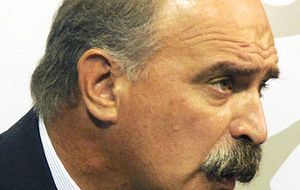MercoPress. South Atlantic News Agency
Inflation in Uruguay remains out of target despite government efforts
 Apezteguía insists that the situation is under control
Apezteguía insists that the situation is under control Uruguay’s inflation in November was over 9% in the last twelve months despite government efforts to contain it by agreeing a price freeze with leading supermarkets and having public utilities’ rates unchanged.
This makes it virtually impossible to keep to the Central bank target range: 4 to 6% both this year and in 2013.
This scenario is expected to further generate inflationary pressures as businesses in anticipation will increase prices and trade unions will certainly not accept at the bargaining table a 5% average inflation for the next twelve months.
In November the CPI was 0.35% totalling 9.03% in the last twelve months, down from 9.11% in October and accumulating 8.27% in the eleven months of 2012.
The Secretary of the Economy and Finance ministry Pedro Apezteguía insisted inflation was ‘under control’ and that “no new measure are planned”, since “we expect the December index to be flat or negative”.
Apezteguia also discarded a reduction in the price of fuel which at one point was considered. In Uruguay power, fuel, communications, drinking water, among other prices are fixed by the government depending on costs and the needs of the Treasury.
“We are confident we don’t need additional measures. The current ones are sufficient” insisted Apezteguia in reference to the monetary decisions from the Central Bank hiking interest rates and contracting liquidity, plus others such as no public utilities increases until January next year; no taxes on personal hygiene goods, moderate salary agreements and agreement with the supermarkets to keep prices until next year except for fresh fruit and vegetables, and meat.
However Pablo Rosselli partner of Deloitte said that prices will continue on the rise next year ‘with persistence’ and risks for the country’s competitiveness and employment and Marcelo Sibille economist from KPMG believes inflation will remain as the main problem for the government next year.
“Having increased interest rates and ‘flattened’ the US dollar out of tune with the main regional partners, Brazil and Argentina, the government is only left with the manipulation of public utilities rates to contain inflation”, plus a serious cost problem for exports.
Pablo Moya from Oikos said that the administration must attack the real roots of the inflationary problem and those are: government overspending and an indexed salaries policy. In this scenario “the private sector will continue to raise prices” unless the government tackles the real problems.




Top Comments
Disclaimer & comment rules-

Read all comments”The Secretary of the Economy and Finance ministry Pedro Apezteguía insisted inflation was ‘under control’ and that “no new measure are planned”, since “we expect the December index to be flat or negative”.
Dec 05th, 2012 - 10:36 pm 0He looks so much like an argie minister I thought at first MP had the wrong picture.
So, what excuses will he come up with when inflation rises again in December?
Put the price of fuels up, already one of the highest petrol prices on the planet?
This man is clearly in the same mould as his boss, the Finance Minister who boasted UTE had dealt with their overspend without the government having to pay anything: they have raised their prices!
These clowns do not understand economics 101, never mind the financial complexities of running a country. Even if, beyond any reason, inflation flattens out he does not understand that this does not let the government off the hook.
Inflation is a rolling 12 month average. If prices are held at their present highs for a year, inflation will be zero!
However, the people of Uruguay will still be struggling with the prices while idiots like this start crowing how they ‘bust’ or ‘tamed’ or ‘killed’ inflation!
WTF the average worker (six or seven 12 hour days a week) AND I do NOT count the government employees (other than medics, police and teachers) as workers will do is beyond me. Their small business owners will not be able to pay 13% wage claims and still keep the business viable.
Commenting for this story is now closed.
If you have a Facebook account, become a fan and comment on our Facebook Page!